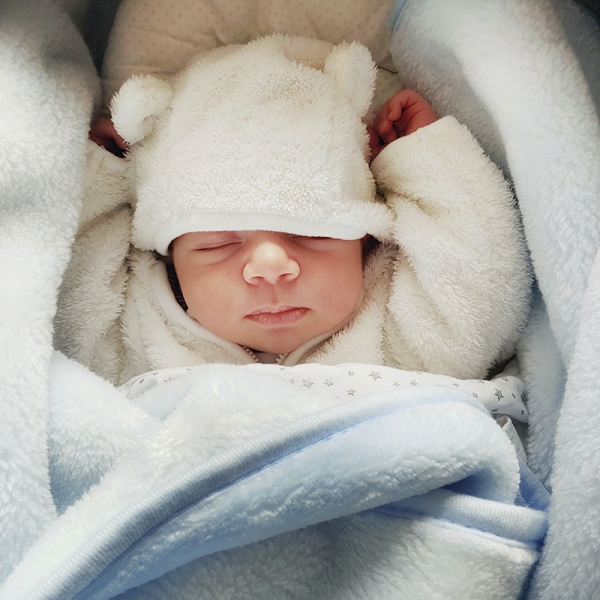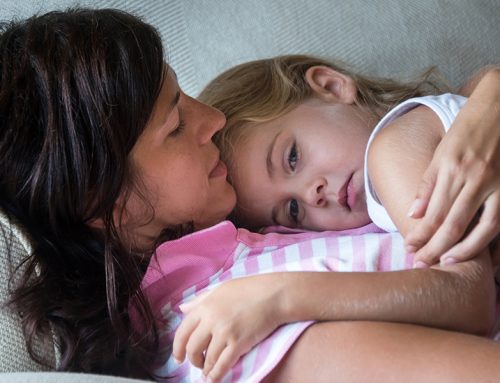Have you just welcomed, or are you about to welcome a new baby into your family? Congratulations! This is a beautiful start to a new chapter and a lot of learning. Starting with your newborns’ relationship to sleep.
After bringing your baby home from the hospital you will quickly notice their affinity for snoozing, and this is completely normal! Karen Gill, MD, FAAP, says: “For the first two or three weeks after birth, most babies do little but eat and sleep.”
Why do newborns sleep so much?
Newborns sleep a whopping average of 16 hours per day; now, that’s a committed relationship. By the age of two, most children will have spent more time asleep than awake.
However, their inconsistent sleep pattern may surprise you; most newborns sleep in increments of one to two hours at a time. They may just wake up to feed and plop right back to sleep again. While it won’t be easy to predict when they might wake up, you can be certain they will mostly be asleep in the beginning months. With that in mind, you may be wondering why, and we’re here to help answer that question.
 Sleep is what they’re used to
Sleep is what they’re used to
Imagine a bear slowly coming out of hibernation during the winter months. This is (almost) akin to your baby being born. They were hibernating in the womb all cozy and warm, then they entered into the real world. It’s very new. They’re not accustomed to the flow of a typical day, when they’ve just been sleeping for months prior. They don’t yet know where they are, much less the difference between night and day.
It’s going to take a baby time to adjust to a different environment. For most babies, it will take around six months until they fully adjust to their own circadian rhythm.
How much sleep do newborn babies need according to age?
While newborn sleep needs still vary from baby to baby, they should be spending 75% of their time sleeping at first, while the rest of the time is spent on feeding and changing. According to the National Sleep Foundation:
“Newborns sleep a total of 10.5 to 18 hours a day on an irregular schedule with periods of one to three hours spent awake. The sleep period may last a few minutes to several hours.”
But don’t worry; as they get older, they will need less sleep and it should slowly become less erratic. It may help to keep a log for your newborn to track their sleep and waking schedule.
In the meantime, these are the recommended sleep time ranges for newborns at various stages:
| Age | Recommended Hours of Sleep (in a 24 hour period) |
Additional Info |
|---|---|---|
| 0-6 weeks |
15-18 (incl. 3-5 naps) |
At this stage they will be awake and asleep in short bursts |
| 6-15 weeks |
14-16 hours (incl. 3-4 naps) |
Slowly starting to stay awake a bit longer in between sleeping. Still feeding often at night. |
| 4-6 months |
9-12 hours (incl. 3 naps) |
Circadian rhythms are starting to form. Regular naps and an earlier bedtime will help. |
| 6-8 months |
12-15 hours (incl. 2-3 naps) |
Should be sleeping a bit longer at night (9-12 hours). |
| 8-10 months |
11-15 hours (incl. 1-2 naps) |
Babies here can start transitioning to 1 nap in the afternoon. |
| 10-12 months |
11-14 hours (incl. 1-2 naps) |
As the baby wades off of naps, they can start going to bed earlier and should be sleeping around 10-12 hours at night. |
Tips for helping your baby sleep
The image of a newborn, sleeping peacefully, is truly angelic. But maybe the scene before isn’t always this way. To help easily soothe your baby to sleep with little hassle, we have the following tips:
- Change your newborn’s diaper before they sleep and use diapers that keep dry longer
Maintain a comfortable, room temperature
- Skin-to-skin cuddling is good for your baby but try to avoid bed-sharing
- Put them to sleep on their back in a baby bassinet, snuggled in a sleep sack. And keep the bassinet void of extra pillows and toys
- Keep the baby fed when they show signs of hunger or every 2.5-3 hours around the clock
- Play soft music while reassuring and rocking your baby gently. But try to avoid them falling asleep in your arms
Help your baby learn the difference between night and day by maintaining a consistent routine in the day (with the lights on) and a soothing bedtime routine at night (dim the lights)
Consult a doctor if you’re having trouble or doubts
If you’re worried about your baby oversleeping or any other noticeable conditions, consult a pediatrician. But there usually isn’t cause for concern unless the baby is experiencing signs of respiratory issues.
Finding your groove with a newborn’s sleep schedule will be a challenge. But nobody said parenting was easy! Take care knowing that a lot of sleep is to be expected for a while. They’ll be an energetic toddler before you know it – so savour this time as much as possible!




